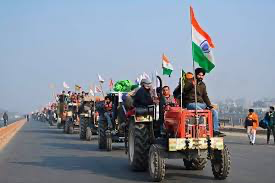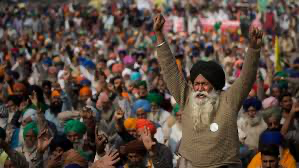By Drew B.
India, specifically New Delhi, has been in turmoil since late last year due to the recently implemented acts reforming previous agriculture laws. The Indian government stated that these were applied to benefit the farming industry. However the small time private farmers feel it is a ploy to assist larger farming corporations. Currently 60% of India's 1.3 billion population rely on agriculture as their source of income and livelihood (Mogul, 2021). These upset farmers have taken to the streets and are rebelling against these new bills passed. They are currently in the 7th month of protesting and are firm that they will not stop until their needs are met.

The Laws
The Bills were passed by the Prime Minister of India, Nerendra Modi and other supporting legislative members. These were intended to allow more freedom of trade and enlarge their markets. The farmers feel this reform was rather disrespectful and bestows all power within corporate walls leaving private farmers in shambles. These new laws consist of “The Farmers Trade and Commerce Act” along with “Farmers Agreement on Price Assurance Act” and the “Essential Commodities Act”. These laws revolve around global electronic trading which most private farmers in India can not afford. (Park, 2021)

The Outcome
The farmers openly have stated that they will not halt protests until these laws are repealed outright. The government has attempted to negotiate with the farmers and protest leaders but they refuse negotiations unless their needs are met, which once again is an outright appeal.

Havoc at the Capital
The protests sparked August 9th, 2020 and are still ongoing today. They began consisting of 200 farm unions throughout 22 different states and have grown to be much bigger over the past few months. The farmers refuse to leave the area and many have been even sleeping there for the past four months (Zargar, 2021). The protests started off fairly moderate and peaceful up until January 26, when a group of farmers stormed India’s historic Red Fort building. This attack left many protesters and police officers injured. In response to the farmer's ambush, the police officers were seemingly forced to use violence back. Prior to the charge, the government was actively trying to put an end to the farmers peaceful protests (Mashal, 2021).

Internet Shutdown
Recently many celebrities and influencers took to twitter to raise awareness for the events. Amongst those two were R&B singer Rihanna and environmental activist, Greata Thunberg (both pictured below). Indian government officials reacted by saying that “the temptation of sensationalist social media hashtags and comments, especially when resorted to by celebrities and others, is neither accurate nor responsible” (Mogul, 2021). In response to the internet traction and statements that were released, the government temporarily dismantled internet connection. These hubs were being used as an outlet for the protesters to publicize the ongoing acts.

References
Zargar, Arshad R. “Greta Thunberg Reiterates Support for India Farmers' Protest despite ‘Threats.’” CBS News, CBS Interactive, 4 Feb. 2021, www.cbsnews.com/news/india-farmers-protest-greta-thunberg-threats-rihanna-meena-harris-modi-government/.
Mogul, Rhea. “Indian Farmers' Protests: Rihanna, Greta Thunberg Lead Growing Support and Draw Furious Backlash.” NBCNews.com, NBCUniversal News Group, 4 Feb. 2021, www.nbcnews.com/news/world/rihanna-greta-thunberg-lead-growing-support-india-s-farmers-draw-n1256700.
Mashal, Mujib, et al. “India's Farmer Protests Explained.” The New York Times, The New York Times, 27 Jan. 2021, www.nytimes.com/2021/01/27/world/asia/india-farmer-protest.html.
Park, Andrea. “India's Farmers Have Been Protesting New Agriculture Laws for Months-Here's Why.” Marie Claire, Marie Claire, 3 Feb. 2021, www.marieclaire.com/politics/a35397911/indian-farmers-protest/.
India, specifically New Delhi, has been in turmoil since late last year due to the recently implemented acts reforming previous agriculture laws. The Indian government stated that these were applied to benefit the farming industry. However the small time private farmers feel it is a ploy to assist larger farming corporations. Currently 60% of India's 1.3 billion population rely on agriculture as their source of income and livelihood (Mogul, 2021). These upset farmers have taken to the streets and are rebelling against these new bills passed. They are currently in the 7th month of protesting and are firm that they will not stop until their needs are met.
The Laws
The Bills were passed by the Prime Minister of India, Nerendra Modi and other supporting legislative members. These were intended to allow more freedom of trade and enlarge their markets. The farmers feel this reform was rather disrespectful and bestows all power within corporate walls leaving private farmers in shambles. These new laws consist of “The Farmers Trade and Commerce Act” along with “Farmers Agreement on Price Assurance Act” and the “Essential Commodities Act”. These laws revolve around global electronic trading which most private farmers in India can not afford. (Park, 2021)
The Outcome
The farmers openly have stated that they will not halt protests until these laws are repealed outright. The government has attempted to negotiate with the farmers and protest leaders but they refuse negotiations unless their needs are met, which once again is an outright appeal.
Havoc at the Capital
The protests sparked August 9th, 2020 and are still ongoing today. They began consisting of 200 farm unions throughout 22 different states and have grown to be much bigger over the past few months. The farmers refuse to leave the area and many have been even sleeping there for the past four months (Zargar, 2021). The protests started off fairly moderate and peaceful up until January 26, when a group of farmers stormed India’s historic Red Fort building. This attack left many protesters and police officers injured. In response to the farmer's ambush, the police officers were seemingly forced to use violence back. Prior to the charge, the government was actively trying to put an end to the farmers peaceful protests (Mashal, 2021).
Internet Shutdown
Recently many celebrities and influencers took to twitter to raise awareness for the events. Amongst those two were R&B singer Rihanna and environmental activist, Greata Thunberg (both pictured below). Indian government officials reacted by saying that “the temptation of sensationalist social media hashtags and comments, especially when resorted to by celebrities and others, is neither accurate nor responsible” (Mogul, 2021). In response to the internet traction and statements that were released, the government temporarily dismantled internet connection. These hubs were being used as an outlet for the protesters to publicize the ongoing acts.
References
Zargar, Arshad R. “Greta Thunberg Reiterates Support for India Farmers' Protest despite ‘Threats.’” CBS News, CBS Interactive, 4 Feb. 2021, www.cbsnews.com/news/india-farmers-protest-greta-thunberg-threats-rihanna-meena-harris-modi-government/.
Mogul, Rhea. “Indian Farmers' Protests: Rihanna, Greta Thunberg Lead Growing Support and Draw Furious Backlash.” NBCNews.com, NBCUniversal News Group, 4 Feb. 2021, www.nbcnews.com/news/world/rihanna-greta-thunberg-lead-growing-support-india-s-farmers-draw-n1256700.
Mashal, Mujib, et al. “India's Farmer Protests Explained.” The New York Times, The New York Times, 27 Jan. 2021, www.nytimes.com/2021/01/27/world/asia/india-farmer-protest.html.
Park, Andrea. “India's Farmers Have Been Protesting New Agriculture Laws for Months-Here's Why.” Marie Claire, Marie Claire, 3 Feb. 2021, www.marieclaire.com/politics/a35397911/indian-farmers-protest/.




